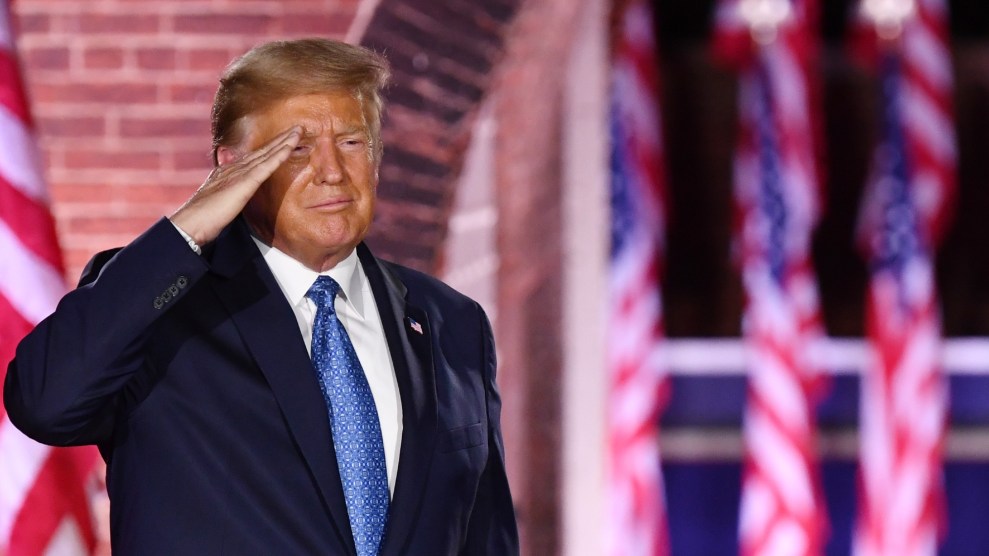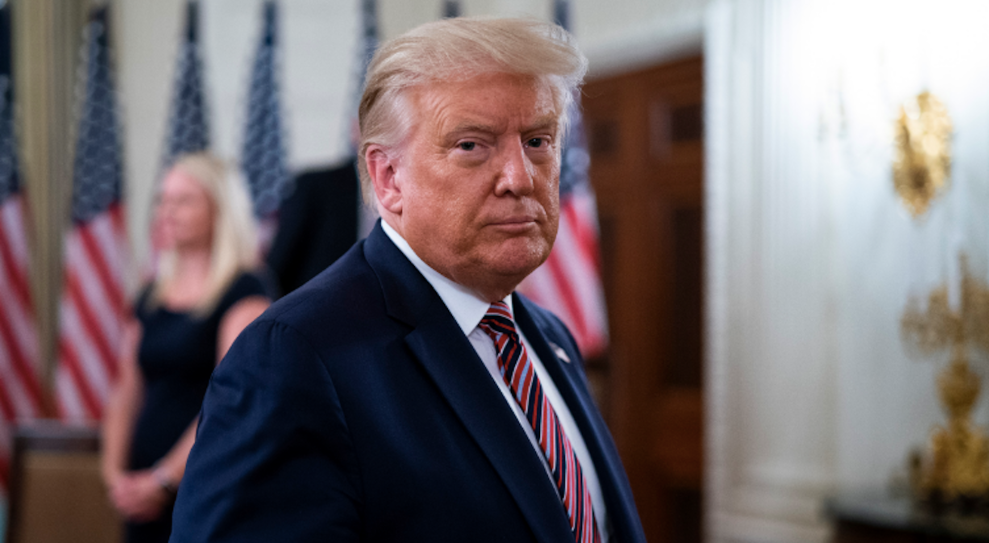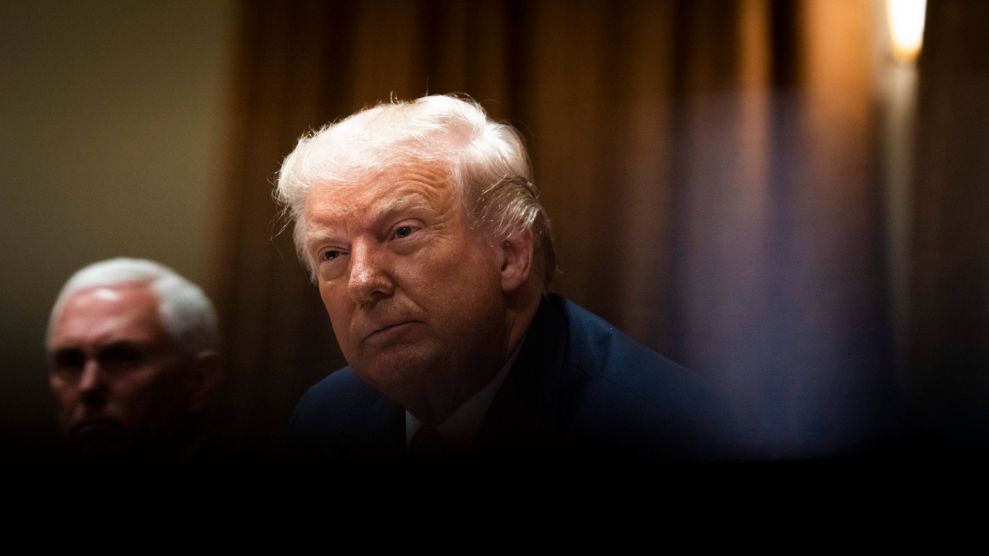
Kevin Dietsch/CNP via ZUMA
As President Donald Trump prepares to formally accept the Republican Party’s nomination for his reelection contest with a speech at tonight’s convention, the last-ditch dismantling of the US Postal Service before the 2020 election lays bare his latest campaign strategy: cheating. Behind in the polls for months, a popular vote win for the president in November looks impossible. A narrow Electoral College victory, like the one that saw Trump win the White House in 2016, appears feasible, but polls show Trump behind in critical swing states. As Trump rages that Democrats are trying to steal the election with mail-in ballots, it’s now clear that disenfranchising those voters is a key part of his panicked attempt to hold onto power.
It didn’t have to be this way. But it was also predictable, even preordained. As Trump shirked his responsibility to respond to the coronavirus pandemic and refused to work with Democrats to pass more economic stimulus this summer, polls showed his chances of reelection dim. When turning to racist scare tactics didn’t improve the numbers, disenfranchising voters was an obvious next step. But there was one force that was supposed to keep the president from resorting to such eleventh hour schemes: a competent campaign.
Trump’s reelection effort is, by its own account, the most well-funded, digitally savvy, data-soaked operation in American history. But the campaign has proved unable to pull Trump out of this quagmire because it has fallen victim to the same pitfalls that have defined Trump’s presidency: corruption and incompetence. Just as these ineptitudes prevented Trump from stopping the pandemic and rescuing the economy, they appear to have kept Trump’s campaign from actually doing a good job trying to reelect him. If Trump’s campaign hadn’t been so ineffective, maybe the president wouldn’t be destroying the postal service right now.
No insider’s secret confession is needed to know the campaign has been a disaster. It’s all out in the open, in its public financial records, in its digital ads, and in its haphazard messaging. I’ve been closely watching the campaign for more than a year, wondering when it would mature into a general election juggernaut, curious about all the secretive entities on its financial disclosure forms, and trying to follow the money. But even without a forensic accounting, it is easy to see that it is going to incompetent people profiting off a flailing effort.
In the midst of the catastrophic events of 2020, the presidential candidates’ campaigns may themselves ultimately play a small role in the election’s outcome. Early this spring, Joe Biden held a polling lead despite spending months doing almost nothing, rarely leaving his house, and with his campaign short on cash and low on staff. Whether they deserve it or not, the winning campaign team usually gets credit. In 2016, press and politicians alike looked to the Trump campaign’s Facebook strategy to explain Trump’s surprise victory, when it could have just as easily been explained by voter suppression, James Comey’s clumsy last minute intervention in the election, Russia’s malign interference, racism, sexism, or Hillary Clinton’s strategic blunders. It’s important to understand the Trump campaign’s failures this year, because if he wins in three months, observers will be tempted to find a secret genius hidden in their strategy. But the evidence suggests there’s no miracle worker ready to rescue Trump. If he prevails, look for the explanation in his cheating and purposeful unraveling of our democracy.
Trump officially filed his reelection paperwork the day he was sworn into office on January 20, 2017. The move allowed him to immediately set up a campaign apparatus, hold campaign events, and begin raising money. It also meant that while Trump’s 2020 challenger would only have months to put together a general election campaign, Trump would have four years. His first high-dollar fundraiser in June 2017 was held at Trump’s DC hotel—an early sign that the campaign would work toward the president’s reelection while enriching his businesses. It also set a precedent that the campaign’s finances could serve multiple purposes. If Trump could direct campaign dollars into his company, surely other campaign executives would be forgiven for doing the same. And for a long time, they were.
In early 2018, Trump chose Brad Parscale, his digital guru in 2016, to run the reelection campaign. Parscale, who’d run a web marketing firm in San Antonio, was still new to campaigns. In fact, he’d learned everything he knew about politics from Trump, and from cozying up to Jared Kushner and Trump’s children. So under his leadership, it was no surprise that the campaign began to resemble the president and the way he does business. Parscale directed significant sums to his own companies for various digital services, and used money funneled into his businesses to pay Trump’s daughter in law, Lara Trump, and Kimberly Guilfoyle, Don Jr.’s girlfriend. He became close with two longtime Republican operatives, Katie Walsh and Mike Shields, a husband and wife duo who also began to profit handsomely from Republican contracts. The campaign became a family business, an apparatus that awarded money to a loyal few. The question was whether it could simultaneously be a good campaign. It could not.
Parscale proved a little green when it came to preparing for 2020. For all the hundreds of millions of dollars the campaign spent on Facebook to energize voters and accumulate small dollar donations, it failed to create the robust fundraising base that it had hoped for. As a consequence, the campaign has been forced to continually spend large sums on small dollar fundraising. With less than three months until Election Day, the Trump campaign is still spending around 40 percent of its Facebook ad budget outside of battleground states to maintain his fundraising base. In June, for example, the Biden campaign raised nearly three times as much money from small dollar donors—those who give less than $200—than the Trump campaign. To try to keep up, Trump is spending millions advertising to Facebook users in blue states like California and New York instead of people who live in battleground states.
By early March 2020, it was clear that Joe Biden would be the Democratic nominee, and I waited for the Trump campaign to mobilize its massive operation to attack Trump’s challenger. But even now, just a few months from the election, the full might of the “Death Star,” as Parscale unironically dubbed the campaign, has never materialized. This summer, as Biden’s campaign came together and began to outraise the president’s, the Trump campaign began throwing spaghetti against a wall. Some Facebook ads portrayed Biden as too old and senile, though some advisers worried the message would cause them to lose further ground among seniors already upset over Trump’s handling of the coronavirus. Some attacked him with false allegations about his work in Ukraine as vice president. As the Black Lives Matter protests heated up, the campaign attacked him as a radical leftist who wanted to defund the police. Though none of the spaghetti appeared to stick, the same themes returned throughout the Republican convention.
To understand how bizarre this situation is just months out from the election, it’s helpful to compare it to a campaign done right. In 2011, a small band of Obama administration staffers formed a super PAC to help reelect their boss in 2012. Before Mitt Romney had clinched the Republican nomination, the group began plotting to portray Romney as a far-right politician. But the message didn’t work. As Robert Draper reported in the New York Times magazine in 2012, when the operatives told focus group participants that Romney supported a plan that would “end Medicare as we know it” while cutting taxes for the wealthy—which was indeed a plan Romney supported—the group was unmoved. They “simply refused to believe any politician would do such a thing,” Draper wrote. Voters did not see Romney, the awkward rich guy, as an extremist. So the pro-Obama group pivoted, instead portraying Romney as a corporate raider who had grown rich by destroying the jobs of working class Americans through private equity. In the spring and summer of 2012, before Romney had the time or resources to fight back, this messaging defined Romney and helped Obama to a second term.
This spring, Biden was that same sitting duck. All the incumbent Trump campaign—and its own supporting super PAC flush with cash—had to do was find an effective attack and run with it. But Trump’s super PAC, America First Action, was caught flat-footed. As Democratic groups began releasing ads in March slamming Trump for his handling of the coronavirus, Trump’s outside supporters took another month to begin hitting Biden. (Public financial disclosures show the super PAC had spent little to actually prepare for the general election before March.) And the spaghetti approach they arrived at shows that the campaign and its allies never figured out how to attack Biden. Just as voters didn’t buy that Romney was a right-wing extremist, voters don’t seem to be buying that Biden is a radical leftist. Neither do they seem to believe he is the kind of conniving politician who wages foreign policy for personal gain as the Trump campaign claimed with its Ukraine attacks. That gambit comes off as an incredible expression of projection in which they assumed that just because Trump used foreign policy for personal gain, others must do the same.
This failure to find and prepare a coherent attack has so far extended to Biden’s vice presidential pick, California Sen. Kamala Harris. Though Biden’s search for a running mate lasted months, Harris was always a frontrunner. Yet if team Trump prepared for a Biden-Harris ticket, its response didn’t show it, as the campaign responded to her pick by releasing contradictory messages portraying her as both a radical stooge of the far-left and a centrist phony. Only they know if the focus groups thought this confused message was best.
Democratic digital minds are also scratching their heads at the Trump campaign’s online message. It’s a trite but true adage, they say, that incumbent presidents win re-election if the campaign is about their opponent, but lose if it’s a referendum on him. By this logic, Trump should be using his ad dollars to attack Biden, not draw attention to himself. On TV, the Trump campaign has done that, including what are likely some of its most effective ads portraying Biden as a 47-year Washington veteran with a record of failure. (In a revealing move, the campaign pulled its TV ads this week to conserve money while the GOP convention generates coverage.) But, according to an analysis by Bully Pulpit Interactive, a Democratic digital firm, rather than reinforce those attacks online, a majority of Trump Facebook ads from June through early August are about him; just 35 percent mention Biden. The firm also found that even though voters say they care most about health care and the economy, Trump’s campaign has spent more catering to his base with digital messages about “socialism” and “fake news.” These patterns only make sense for a campaign geared toward inciting Trump’s base, raising money off of them, and ignoring the rest of the country’s problems—just as Trump has done as president.
The Trump campaign often brags that it has massive amounts of data on American voters which gives them a leg up when it comes to messaging and targeting. Most Democrats I’ve spoken with don’t dispute that the RNC, which poured significant resources into its data bank after 2012, probably has more and better data. But there’s little outside evidence that the data is being deployed well.
The two Republican firms that led the Trump campaigns’ data targeting in 2016 are no longer on the payroll. Instead, in January, the Trump campaign contracted Matt Oczkowski as a data consultant to help target media buys, direct surrogates, and determine which states would provide Trump’s path to victory, according to Politico. Since then, the Trump campaign has paid Oczkowski $150,000. It’s not a large sum all considered, but Oczkowski is an odd choice for such key tasks. He worked on Trump’s 2016 campaign as a product manager from Cambridge Analytica, but was not in the room when key decisions about data analysis and targeting were being made. Oczkowski currently holds a full-time job running two firms under a penny-stock company in San Antonio that is connected to Brad Parscale. If the Trump campaign is truly outsourcing this work to Oczkowski, it may not be getting the most sophisticated advice. But that may not be the point of an arrangement that ensured a friend of Parscale was placed on the payroll. Either way, it’s an illustration of a campaign that is probably not being run, as Trump once bragged, by the best people.
Trump’s campaign was presented a chance to make changes when Parscale was demoted in mid-July and a new campaign manager, Bill Stepien, took over. Upon gaining control, Stepien announced an audit of the campaign’s vendors and finances. He paused all TV ads for several days in order to review how they were being targeted, even though that is something the campaign was supposed to have been really good at. The New York Times reported that the campaign would stagger its TV buys so that states with early voting get ads earlier—but with a war chest like his, shouldn’t they have the money to target all key states now? According to New York magazine, Stepien requires people to show up early and work late. He holds regular meetings. In sum, he has made managerial changes—not messaging changes.
Back in May, with Trump down in the polls and the coronavirus spreading uncontrollably, the Republican National Committee announced it was doubling its funding of voter suppression lawsuits to $20 million. Across the country, RNC lawyers are now launching lawsuits that would make it harder to vote by, for example, litigating against moves to send absentee ballots to all voters or to set up ballot drop-off boxes, while forcing requirements like witness signatures on absentee ballots. In other cases, the RNC’s lawyers have intervened to try and stop Democratic efforts to expand access to the ballot. The party, like the campaign whose job it is to support, knows that Trump’s ability to win is tied to how many people it can stop from voting.
Trump didn’t need low poll numbers to induce him to cheat. A president whose corruption goes unchecked by his own party—even when he is caught and impeached for asking a foreign government for help with his re-election—is a president who will continue to cheat as that election nears. Trump’s campaign welcomed Russian election aid in 2016, so it’s no surprise that Trump made requests for help in 2020 not only to the president of Ukraine but also, reportedly, the leaders of China and Brazil. A president who has obsessed over voter fraud conspiracies was always likely to invoke them to cast doubt on the legitimacy of the election. An administration that has generally sought to dismantle and privatize government functions was always likely to sabotage the postal service.
At the end of the day, Trump has run his campaign like he has run the country, in a way that enriches himself while only being accountable to his base. That might be just enough to re-elect him. But Republicans’ anti-democratic actions suggest that this time, they think they will need a little something extra.













